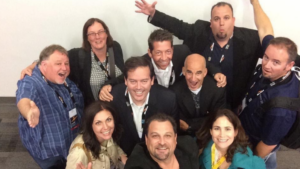Atari revolutionized games. Pacman, Space Invaders, and Centipede (to name a few). The most incredible innovation was made by connecting a computer (gaming console) to a television and turning digital gameplay into something available to everyone. Their speed to market was created by this simple vision, changing the family room experience forever. I recently heard Nolan Bushnell, speak at C2SV (Creative Convergence Conference in San Jose) and he described these experiences on stage with Steve Wozniak. They both inferred that the excitement and speed were self-created by a passion to build something new and make it available to the masses to see what happened.
That’s not the case today. Why are things moving more quickly and yet innovation, with respect to today’s social economy, is moving so slowly. As Nolan suggested, “we are behind 10 years in innovation, I don’t have much time left so everyone, please start kicking some ass!” We’re living in an economy where marketing is driving decisions faster than ever before, yet clarity is low. Data is overflowing, yet the right action is poor at best. And marketers are having to pick up the pace and go faster. We have a lot of work to do here!
Social marketing now drives a faster everything. In fact, social forces marketers to go faster, not the other way around. It’s for this exact reason that businesses are afraid to become a social business. Take Uber for example. Their vision was simple in creating a service that put the power of seamless ‘right now’ transportation into the palm of our hands. How about Apple? Steve Wozniak talked about how they originally set out with a simple vision to build a personal computer. They built the first personal computer that delivered a word processor. It turned out that the computer called for the networking, which quickly grew into the need for the internet. We needed a way to see the new clusters of information created on the internet, so search engines were born. And now, social commerce is enabled. Steve says “we did not build a computer knowing all this was going to happen, we started with a simple vision.”
As consumers, we all purchase something because a product or service solved a problem in a way that no one else has been able to solve. This also translates through experiences. As with Uber, it isn’t the fact that we want to take a ride in a nice black car, which frankly is more expensive than a taxi. What it solves for consumers is the ability to be in control of their transportation immediately. Everything else about the experience Uber delivers is just the cherry on top.
True social businesses are few and far between, only because the complexities and data is so overwhelming. Becoming a business that perpetuates creative problem solving powered by social today means you first have to listen in order to keep up. It’s important that businesses use social to co-create ideas and innovation. We still need leadership and vision, but the power of one top-down voice is gone. Finally, it’s no secret that creating shareable experiences through storytelling has changed. Strategically speaking, giving your brand, product or service more shareable experiences means putting more thought into creative ingenuity like never before. Humans can detect carefully crafted and unique experiences through authentic storytelling. They respect it more!
KEY TAKEAWAY: Keeping up with the social universe is challenging but necessary if you want to operate your marketing at unfathomable speeds. Find the people, technology and resources you need to operate as a social business, and you too can experience game-changing excitement and passion to your customers and company.
Image Source: Mission Mode






